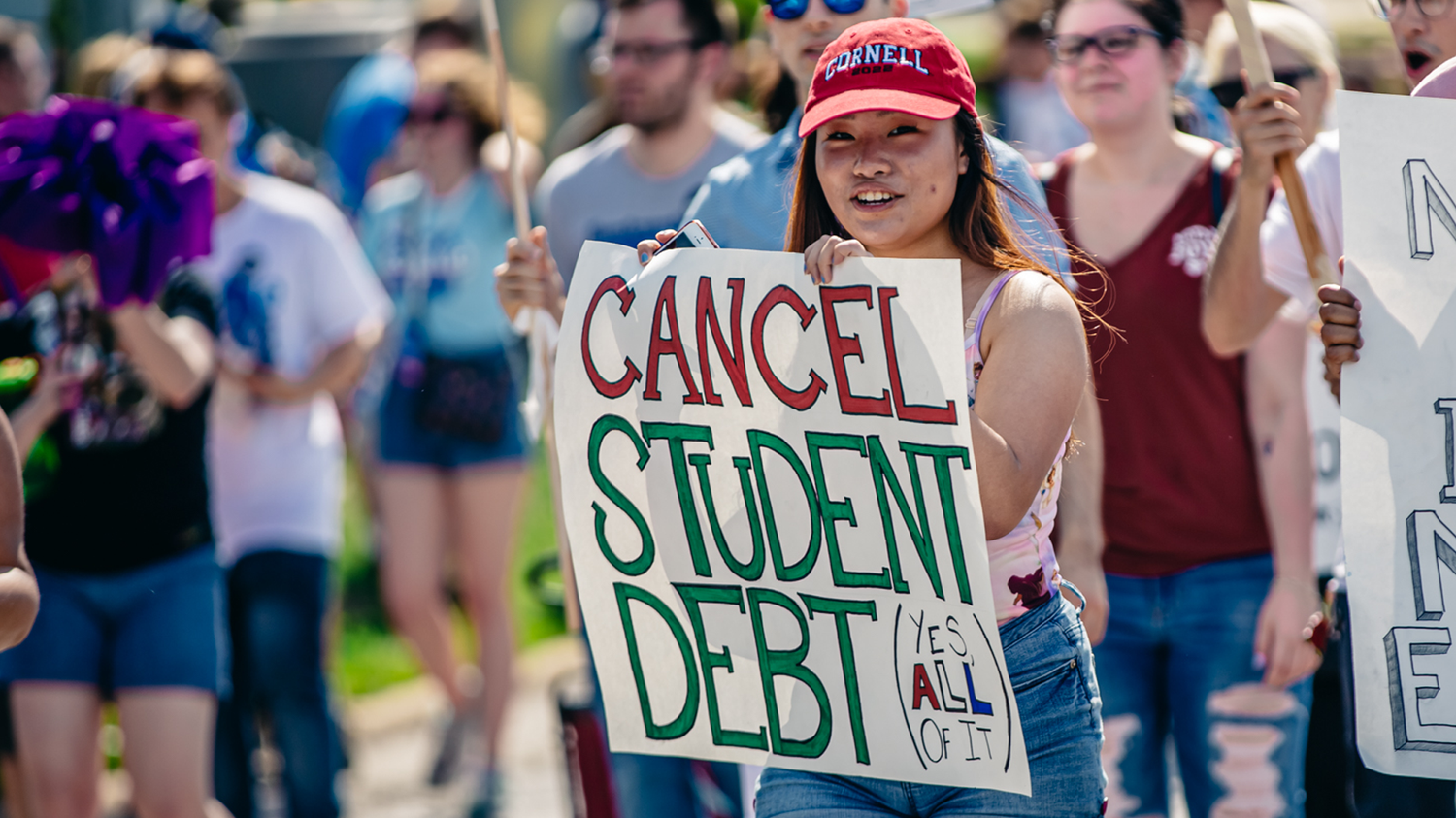A majority of voters in Washington of all ages support forgiving all federal student loan debt to liberate millions of Americans from continuing to carry a crushing, anxiety-inducing financial burden, according to our most recent statewide poll.
52% of 700 likely 2022 Washington State voters surveyed by Public Policy Polling for NPI back in February 2022 favor debt forgiveness for all student loan borrowers, while 44% are opposed. 4% of respondents said they were not sure.
“The U.S. Department of Education holds nearly $1.6 trillion in federal student loans and more than 45 million individual borrowers live in the shadow of that massive debt,” the Student Debt Crisis Center noted in a March 7th letter to President Joe Biden signed by hundreds of organizations.
“Payments on most of these loans have been paused since March 2020, during which time interest charges have also been suspended and the federal government has halted collection efforts against most borrowers in default.”
The pause has been scheduled to end in just a few weeks. Today, administration officials let it be known that they are working on extending the pause through August 31st. While a further extension would definitely avert a sudden fiscal hardship as of the first of May, it won’t solve the underlying problem.
But permanently forgiving all of that debt would be liberating.
“I think some folks read these extensions as savvy politics, but I don’t think those folks understand the panic and disorder it causes people to get so close to these deadlines just to extend the uncertainty,” noted Representative Alexandria Ocasio-Cortez. “It doesn’t have the affect people think it does. We should cancel them.”
People like Jessica, a young woman in Detroit, are presently saddled with big debts that are crushing them. As Jessica wrote: “I desperately want to live my potential, to make use of the blessing of life after cancer, but ten years of loan deferment has broken me. I see no way of climbing out of this hole.”
“The stories here are heartbreaking. That so many are so profoundly financially crippled — for decades! — because they worked to get the educations they’ve been told would help them obtain gainful employment, but their promised trajectory was sacked by an Act of God. It’s wrong and it’s sad and needs to end.”
NPI’s research shows that most Washingtonians agree with this sentiment.
Here is the question we asked and the responses we received:
QUESTION: After taking office, President Joe Biden paused federal student loan repayments to manage the ongoing pandemic and further strengthen America’s economic recovery. The pause is scheduled to end on May 1st, 2022. Do you strongly support, somewhat support, somewhat oppose or strongly oppose making the pause permanent by forgiving all federal student loan debt?
ANSWERS:
- Support: 52%
- Strongly support: 35%
- Somewhat support: 17%
- Oppose: 44%
- Somewhat oppose: 9%
- Strongly oppose: 35%
- Not sure: 4%
Our survey of 700 likely 2022 Washington State voters was in the field from Thursday, February 17th through Friday, February 18th, 2022.
It utilizes a blended methodology, with automated phone calls to landlines (50%) and text message answers from cell phone only respondents (50%).
The poll was conducted by Public Policy Polling for the Northwest Progressive Institute and has a margin of error of +/- 3.7% at the 95% confidence interval.
More information about the survey’s methodology is available here.
As you might suspect, there’s a big age divide in these answers.
Young voters — a key demographic for Joe Biden and Democrats — are overwhelmingly supportive of forgiving all federal student loan debt.
68% of voters between the ages of eighteen to twenty-nine support forgiveness (with 57% strongly supportive), while 62% of voters between the ages of thirty to forty-five are supportive. Voters between the ages of forty-six to sixty-five are split, with 45% supportive and 49% opposed, while voters older than sixty-five are the least enthusiastic, with 44% supportive and 52% opposed.
We also saw a big gender divide in these answers. Voters identifying as female were far more supportive than voters identifying as male. 59% of female voters support forgiveness, while only 45% of voters identifying as male do.
But the biggest disparity of all was between Democrats and Republicans.
Nearly nine in ten Democratic voters back forgiveness (88% total, 62% strongly), while only 14% of Republican voters do. Two-thirds of Republicans strongly oppose forgiveness, and 11% are somewhat opposed. Independent voters are more mixed, with 41% supportive and 56% opposed.
National-level research indicates that there are even higher levels of support for simply continuing the moratorium (which is echoed by findings from swing states like Wisconsin or Arizona), but as mentioned, that’s not a long term solution.
Not only is forgiving student loan debt a just and responsible course of action, it’s good politics for Democrats. The party needs an energized progressive base to maximize its chances in the midterms, and taking action to get rid of student loan debt would deliver a nice jolt of energy ahead of the upcoming elections for U.S. House and Senate. Senator Patty Murray would be wise to take up this cause and join colleagues like Elizabeth Warren in urging President Joe Biden to issue an executive order forgiving federal student loan debt.

